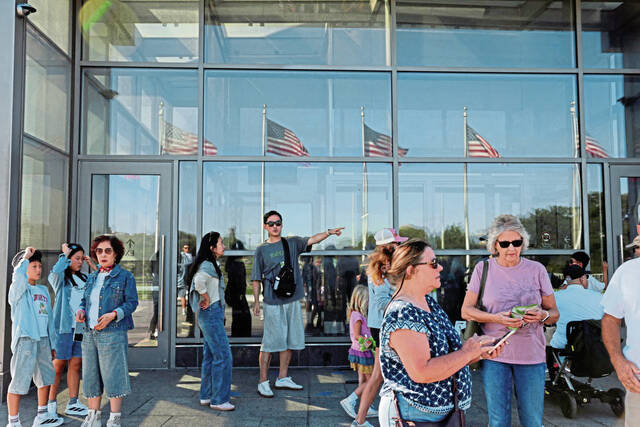https://triblive.com/news/world/federal-shutdown-could-cost-u-s-economy-up-to-14-billion/
Federal shutdown could cost U.S. economy up to $14 billion

WASHINGTON — The federal government shutdown could cost the U.S. economy between $7 billion and $14 billion, shaving up to 2% from gross domestic product in the fourth quarter because of the lapse in government spending, the nonpartisan Congressional Budget Office said on Wednesday.
The partial shutdown was in its 29th day Wednesday with no end in sight, as Senate Republicans called on Democrats to support a stopgap measure to fund federal agencies through Nov. 21 and Democrats demanded negotiations to extend expiring federal tax credits to help Americans purchase private health insurance coverage through the Affordable Care Act.
CBO estimated the economy would suffer as a result of delayed federal spending for employee compensation, goods and services, and food stamp benefits for low-income Americans.
“Although most of the decline in real GDP will be recovered eventually, CBO estimates that between $7 billion and $14 billion will not be,” agency director Phillip Swagel said in an Oct. 29 letter to House of Representatives Budget Committee Chairman Jodey Arrington, a Texas Republican who requested the analysis.
“The effects of the shutdown on the economy are uncertain. Those effects depend on decisions made by the administration throughout the shutdown,” Swagel wrote.
About 750,000 federal workers have been furloughed since government funding ended Oct. 1, the start of the 2026 federal fiscal year. The Trump administration has taken steps to provide pay to U.S. troops, federal law enforcement agents and immigration officers. Other federal employees have continued to work without pay.
CBO said the economy would suffer a permanent loss of $7 billion if the shutdown ended this week. A six-week shutdown continuing to Nov. 12 would cost $11 billion and an eight-week shutdown lasting until Nov. 26 would cost $14 billion, the agency said.
Dem bill to fund SNAP, WIC blocked
A bill to keep funds flowing to food stamps and nutritional programs for low-income women, infants and children was blocked on the Senate floor Wednesday.
Supplemental Nutrition Assistance Program funds will lapse for the first time Nov. 1 if the government shutdown doesn’t end or lawmakers don’t allocate funds to the program. Money for the Special Supplemental Nutrition Program for Women, Infants and Children, known as WIC, could run out soon, even with a recent emergency cash infusion earlier this month.
Sen. Ben Ray Luján asked the Senate to pass his bill that would fund SNAP and WIC through the government shutdown, which is on day 29.
“Pass this bill now,” Luján said on the Senate floor. “Fund SNAP, fund WIC, before this hunger crisis hits our communities.”
Majority Leader John Thune forcefully objected to it on the Senate floor, calling for lawmakers to instead pass the House-passed temporary funding bill.
“The senator from New Mexico is absolutely right. SNAP recipients shouldn’t go without food. People should be getting paid in this country, and we’ve tried to do that 13 times. And you voted no 13 times,” Thune said.
“This isn’t a political game,” he added. “These are real people’s lives we are talking about, and you have all just figured out 29 days in that, oh, there may be some consequences?”
Trump approval rating holds steady
Trump’s approval rating took a slight dip in a new national poll over the last week, but still remains in a months-long plateau stretching back to mid-May.
In a Reuters/Ipsos poll released Tuesday, the president had a 40% approval rating, compared to last week’s 42%. Though the three-day poll measures a 2-point drop since the previous survey, the difference is within the margin of error, maintaining the president’s steady ratings.
The survey also found 50% of Americans were frustrated with the shutdown and another 20% were angry. Some 29% said they either didn’t care or were glad about the shutdown, according to Reuters.
Regarding a main sticking point of the shutdown, 73% of Americans polled say they want the insurance subsidies to continue as Democrats maintain, despite arguments that they will increase the federal budget deficit.
Copyright ©2025— Trib Total Media, LLC (TribLIVE.com)
